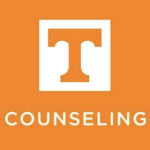The School Counseling program, a 60-hour program, is accredited by the Council for the Accreditation of Counseling and Related Educational Programs (CACREP), and meets educational requirements for licensure as a school counselor in Tennessee and many other states. Our program is offered in a face-to-face format in Knoxville, TN. Most students enroll on a full-time basis; part-time options are available by advisement. Most courses are offered during the day, Monday-Thursday.
Please Note: The GRE is not required for applicants to the School Counseling Program.
Request More Info About School Counseling
The program prepares students to become professional school counselors within preK-12 schools in Tennessee and most states. Our students learn about their role as leaders within a data-driven comprehensive, developmental school counselor program as supported by the the TN Model for School Counseling and the ASCA National Model®. Throughout our program, we work to embrace our core values–Commitment, Humility, Openness, Respect, Integrity, and Self-Awareness–and to attend to culturally sensitive, developmentally appropriate, and ethical relationships.
Rural Appalachian Mental Health Partnership Grant
Great news! The MS Program has a grant available for students! See below for more information on Rural Appalachian Mental Health Partnership (RAMHP) funding for School Counseling students.
RAMHP provides an evidence-based, culturally inclusive school counseling and school psychology service in high-need, rural Appalachian schools. Six school counseling/dual track scholars and six school psychology RAMHP scholars will be selected each year. This partnership provides two years of financial support.
Award
Two years of financial support.
- Year 1: $10,000 scholarship
- Year 2: $10,000 scholarship, $10,000 field experience stipend, travel reimbursement.
Requirements
Year 1
- Engage in monthly RAMHP professional development and cohort-building activities (working with rural youth, MTSS, universal screening, and evidence-based mental health interventions)
- EDPY 580: course on evidence-based practices (SC elective)
- COUN 570: Social and Cultural Diversity in Counseling (required course)
Year 2
- Internship placement in a high-need partner school in Cocke, Greene, Grainger, or Newport City district
- Continued RAMHP supervision and professional development
Post-graduation
- Service obligation of two years of school counseling or psychologist work in a high-need school based on one or more of the following:
- A low-income school (at least 20% o students considered low-income in the district)
- Rural school (SRSA or RLIS designation)
- High student-to-counselor ratio
- Significant student mental health needs
About School Counseling
The mission of the University of Tennessee Master of Science (MS) School Counseling program is to equip graduate students with the competencies to excel as preK-12 professional school counselors. The faculty in this flagship, land-grant institution expects our graduates to serve as leaders in the profession through advocacy, collaboration, and systematic change while attending to an ever-changing, diverse educational community. Due to the rigorous standards and expectations established by the faculty, school counselor trainees successfully complete the Praxis exam and meet credentialing standards for most states.
Objectives:
- Graduates will have foundation knowledge necessary for success as professional counselors.
- Graduates will be able to develop therapeutic relationships that are deeply healing, culturally sensitive, developmentally appropriate, and ethical.
- Graduates will demonstrate professional dispositions including Commitment, Openness, Respect, Integrity, and Self-Awareness (CORIS).
- Graduates will be culturally sensitive and ethical advocates for self, clients, and profession through counseling interventions, programming, and professional and community engagement.
- Graduates will be well-skilled in the full range of tasks needed to coordinate a comprehensive, developmental school counseling program that addresses the academic, career, and social-emotional development of preK-12 students.

An acronym C H O R I S to highlight core values counseling programs and their students hold.
Core CACREP-Accredited Program Faculty
Casey A. Barrio Minton*
Department Head
Professor
cbarrio@utk.edu
865-974-8382
Jeff L. Cochran*
Professor
jcochr11@utk.edu
865-974-4178
Jamian Coleman, PhD*
Assistant Professor
jcolem73@utk.edu
865-9740734
Joel F. Diambra*
Associate Professor
jdiambra@utk.edu
865-974-8774
Melinda M. Gibbons*
Professor
mgibbon2@utk.edu
865-974-4477
Hyunhee Kim, PhD*
Assistant Professor
hkim103@utk.edu
865-974-5487
Jordan Westcott, PhD*
Assistant Professor
jwestco1@utk.edu
865-974-3845
*Designated as core faculty members for this program.
Information for Potential Applicants
Beginning in 2023, all Master’s students will begin study during the Summer (June) semester only. The application deadline for Summer 2025 entry is December 1, 2024. Please Note: The GRE is not required for applicants to the School Counseling Program.
We have linked FAQs about the program and application process on the next page. You can also use the link on the next page to reserve a space in a program information session.
Please direct admission or application inquiries to COUNADMIT@utk.edu
Our CACREP-accredited master’s program in school counseling will fulfill licensure requirements for PreK-12 school counselors in Tennessee and in most states of the US. Our program is also approved to offer Job Embedded Practicum for the state of TN. Advisors can help students understand the degree to which our programs meet educational requirements for licensure in other states.
Students admitted to the MS degree have the opportunity to complete all educational and field experience requirements for Clinical Mental Health Counseling and School Counseling. Although the dual option does not require additional credit hours, the program must be completed over three years to allow one year of internship in School Counseling and one year of internship in CMHC. Students may apply for the dual option in their first semester of study.
We are proud to be able to offer School Counseling candidates funding through RAMHP (Rural Appalachian Mental Health Partnership). RAMHP scholars can earn $20,000 in scholarships, $10,000 in internship stipend, and mileage as part of participating in the program. To learn more, contact Dr. Melinda Gibbons.
Unfortunately, the department is unable to provide graduate assistantships for MS students. However, other assistantships are available on campus. See the Graduate School’s Costs and Fundingpage for more information.
CACREP Accreditation Information
Updated 10/27/2023







